On the East Coast, West Coast and in heartland states between them, LGBT candidates scored a raft of notable midterm election victories — winning two governorships, at least nine seats in Congress, and their first-ever legislative seats in Indiana, Kansas and Nebraska.
The head of the LGBTQ Victory Fund, which recruits and assists LGBT candidates, said many of the winners in Tuesday's elections were motivated by concerns over the Trump administration's rollback of protections for transgender people.
"We've worked hard to achieve the rights we have today," said the fund's CEO, former Houston Mayor Annise Parker. "But we realize we're still in a vulnerable position in many places."
From Parker's perspective, the highlights were many. In Colorado, U.S. Rep. Jared Polis became the first openly gay man elected as a governor of any state. In Wisconsin, Tammy Baldwin — who in 2012 became the first openly gay person to win a U.S. Senate seat — easily won re-election despite being targeted by outside conservative groups that spent millions attacking her.
In races for the U.S. house, a record eight LGBT candidates won seats for the Democrats. Four incumbents— Mark Takano of California, Sean Patrick Maloney of New York, David Cicilline of Rhode Island and Mark Pocan of Wisconsin — will be joined in January by newcomers Katie Hill of California, Sharice Davids of Kansas, Angie Craig of Minnesota and Chris Pappas of New Hampshire.
For two other LGBT candidates, their races were too close to call — U.S. Rep. Kyrsten Sinema's bid for a U.S. Senate seat in Arizona and Gina Ortiz Jones' race for a U.S. House seat in Texas.
Hill, Davids and Craig were among a batch of Democratic winners who flipped control of GOP-held House seats, overcoming initial skepticism that LGBT candidates were not best-suited for that challenge.
"We saw LGBTQ candidates talk openly about their lives to a degree unseen in past elections — and it resonated with voters," Parker said.
In Minnesota, Craig featured her wife and their sons in TV ads en route to winning a rematch against GOP Rep. Jason Lewis in the Twin Cities' suburban 2nd District.
"What I say is my wife and I have four sons, just like any other politician would," Craig said during the campaign. "It'd be cool to be the first openly gay member of Congress from Minnesota, but that's not why I'm running."
In Kansas' 3rd District, near Kansas City, Davids unseated four-term GOP incumbent Kevin Yoder. Being lesbian was only one aspect of an eye-catching biography — she's also Native American, a lawyer, a former White House fellow, and a past competitor in mixed martial arts.
"From the beginning, this campaign has been built on bringing new leaders to the table, and new voices to the table," she said in her victory speech.
In New Hampshire, Pappas did not stress his LGBT status during the campaign, but reacted with passion during a debate when his GOP rival, Eddie Edwards, questioned why Pappas had been photographed wearing a "Resist" T-shirt.
"The photo you are referring to is a rainbow shirt I wore at a gay pride event," Pappas said. "I am proud of who I am and I am proud to stand up against hate, bigotry and intolerance."
In Colorado, which was beset by gay-rights controversies in the past, Polis' successful campaign for governor was striking in that his LGBT status never became a campaign issue.
"We went from a state where our elected officials struggled to provide even basic rights to same-sex couples to a state where a gay man ran for governor and his sexual orientation wasn't discussed as a political liability," The Denver Post wrote in an editorial.
Kayla DeShon, an independent voter from the Denver suburb of Highlands Ranch, said she voted for Polis because of his stance on health care.
"I did not know he is gay. I found out afterward — it was an added bonus," said DeShon, 29. "And I do think that it doesn't matter."
Polis will join Oregon's Kate Brown as the only LGBT governors. Brown, who identifies as bisexual, narrowly won re-election over Republican Knute Buehler.
In state legislative races, the Victory Fund projects that about 130 LGBT candidates will win seats — all but two of them Democrats. That would be up from 121 LGBT legislators heading into the election, according to the fund.
Winning a state Senate seat in Utah was Derek Kitchen, a city councilor in Salt Lake City who rose to prominence when his lawsuit overturned Utah's ban on gay marriage several years ago. Voters in Omaha elected an openly bisexual candidate, Megan Hunt, to the Nebraska Senate.
In New Hampshire, two transgender women, Gerri Cannon and Lisa Bunker, won seats in the state House of Representatives.
A third transgender woman, Brianna Titone, was locked in a too-close-to-call race for the Colorado House. Unofficial near-complete returns showed Titone with a 12-vote lead after more than 47,000 votes were cast.
Among LGBT victors elsewhere was Dana Nessel, elected as Michigan's attorney general. Nessel made headlines as co-counsel in the historic lawsuit that led to same-sex marriage in Michigan.
She said the outgoing GOP attorney general, Bill Schuette, "made a mockery of state government" by bringing social scientists to court to denigrate the parenting skills of same-sex couples.
"There are LGBTQ people clamoring for representation and tired of the office of attorney general using them as a punching bag," Nessel said during the campaign.
In Massachusetts, voters soundly defeated an attempted repeal of a 2016 state law extending nondiscrimination protections to transgender people in the use of restrooms and other public accommodations.
The outcome was hailed by Parker, who was mayor of Houston in 2015 when a trans-inclusive civil-rights ordinance was repealed in a referendum. Opponents of the ordinance played upon public fears with the slogan, "No Men in Women's Bathrooms."
Parker said Massachusetts voters, having lived with the state law for two years, didn't buy such rhetoric.
"They realized it was completely inane fear," she said.
___
Associated Press writer James Anderson in Denver contributed to this report.
__
Follow David Crary at https://twitter.com/CraryAP
Copyright 2018 The Associated Press. All rights reserved. This material may not be published, broadcast, rewritten or redistributed.






